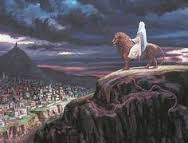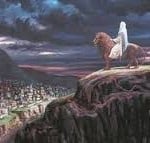Two people can view an event and arrive at two very different interpretations. According to a study, published in the Journal of Neuroscience posits that the mood we are in affects the way we see things .(The brain’s rose-colored glasses, Keise Izuma& Ralph Adolphs, Nature Neuroscience 1355–1356(2011)).It does so by modulating the activity of the visual cortex. Their findings indicate that view we perceive is a function of “the broadness” of the view.
Several years ago I overheard the following exchange at the Western Wall. One young man was trying to describe the Wall and its history and significance to a friend. His friend finally turned to him and said “all I see is bunch of large stones. ‘What was ‘ is not as important as ‘what is’ . The first young man said to him, ‘without knowing ‘what was’ your present is meaningless.
His friend gave him a condescending look and said” you really are talking like a fool”. The first man, nonplussed, answered, also with a smile, “ no actually you are talking like you are blind”
In the Torah portion of Balak we learn of how the “Prophet to the Nations,” Bilaam, attempts to hear G-d’s clear voice in order to curse the people that had come out of the slavery of Egypt. Bilaam, under the prodding of Balak the king of Moav, walks to a place high in the hills where he can view the Israelite people. It was critical for him to “view” or “see ” the people in order for him to deliver the curse. Because through his own power of vision, he saw all that could be seen as negative in these people.
Yet G-d surprises and frustrates him and he is forced to declare the following;
“How shall I curse whom G-d hath not cursed? And how shall I execrate, whom HaShem hath not execrated? For from the top of the rocks I see him, and from the hills I behold him: lo, it is a people that shall dwell alone, and shall not be reckoned among the nations.” (Numbers 23:8-9)
Frustrated, the King Balak tries again; “and Balak said unto him: ‘Come, I pray thee, with me unto another place, from whence thou mayest see them; thou shalt see but the utmost part of them, and shalt not see them all; and curse me them from thence.'” (ibid. 13)
As a result, Bilaam returns with the following message:
“Behold, I am bidden to bless; and when He hath blessed, I cannot call it back. None hath beheld iniquity in Jacob, neither hath one seen perverseness in Israel; HaShem his G-d is with him, and the shouting for the King is among them.” (ibid. 20-21)
Though if left to his desires and to his machinations, Biaam would have seen perversity and evil, yet miraculously G-d forces him to see with G-d’s eyes.
At its most basic level , the art of seeing is connected to the heart’s desire .
We learn in pirkei avot;
He said to them: Go and see which is the worst trait….the one that a person should most distance himself from. Said Rabbi Eliezer: An evil eye. Said Rabbi Joshua: An evil friend. Said Rabbi Yossei: An evil neighbor. Said Rabbi Shimon: To borrow and not to repay; …. Said Rabbi Elazar: An evil heart. Said He to them: I prefer the word of Elazar the son of Arach to yours, for his words include all of yours.( Chapter2:9)
That is to say the stingy, jealous and unforgiving evil eye is encompassed and promoted by the evil heart. Or on a deeper level, what we see is what our heart wants us to see.
As we read in the last paragraph of the Shma;
this shall be fringes for you, and when you see it, you will remember all the commandments of the Lord to perform them, and you shall not wander after your hearts and after your eyes after which you are going astray.”
“you shall not wander after your hearts and after your eyes”, the wandering after your eyes follows the wandering of your heart.
There are many who see what is going on in this land of wonder and only see failure, fear and disappointment. The land is blossoming and blooming and people bemoan the industrialization of the land. The country’s developing industry and technology is developing in miraculous ways and some will only see how the cottage cheese costs less overseas. The growing amount of Torah study and the “returning to the spiritual roots” is blossoming in every corner of the land and there are those who only see secular oppression.
Our vision is only a function of our heart.
LeRefuat Yehudit bat Golda Yocheved

